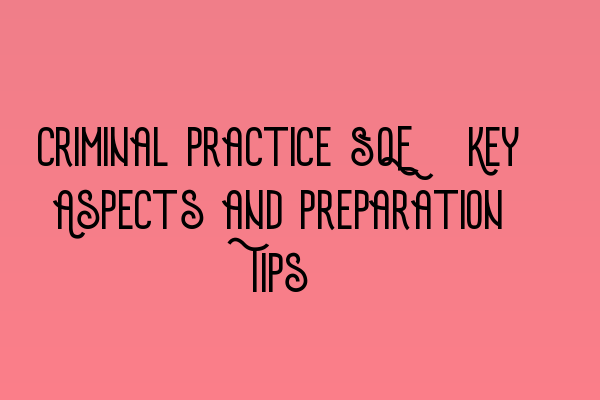Criminal Practice SQE: Key Aspects and Preparation Tips
Are you aspiring to become a criminal lawyer in the UK? The Solicitors Qualifying Exam (SQE) is an essential step in your journey to achieving your goal. In this blog post, we will delve into the key aspects of criminal practice as tested in the SQE and provide valuable preparation tips to help you succeed.
Understanding Criminal Practice
Before diving into the preparation tips, let’s first understand what criminal practice entails. Criminal practice primarily deals with the prosecution or defense of individuals who have been accused of committing criminal offenses. As an SQE candidate, it is crucial to have a comprehensive understanding of criminal laws, procedures, and ethical considerations.
It’s worth mentioning that staying informed about updates in UK criminal laws is essential in preparing for the SQE. Make sure to check out our related article on how to stay informed and prepared with the latest updates in criminal laws.
Key Aspects tested in the SQE
The SQE assesses your knowledge and skills across various key aspects of criminal practice. Some of the key areas tested include:
- Legal principles and frameworks
- Investigation and evidence gathering
- Prosecution and defense
- Court procedures and advocacy
- Sentencing and appeals
Each of these aspects requires in-depth knowledge and understanding. To enhance your study group experience and gain a comprehensive understanding of criminal practice, check out our article on enhancing your SQE criminal law study group experience.
Preparation Tips for SQE Criminal Practice
Preparing for the SQE criminal practice requires a structured approach and diligent study. Here are some tips to help you excel:
- Understand the SQE format: Familiarize yourself with the structure and format of the SQE criminal practice assessment. This will help you understand the types of questions you may encounter and prepare accordingly.
- Become well-versed in criminal laws: Study and memorize the key criminal laws, acts, and regulations relevant to the UK legal system. This will enable you to apply legal principles effectively in practice scenarios.
- Practice critical thinking: Develop your analytical and problem-solving skills by practicing case studies and mock scenarios. This will sharpen your ability to apply legal principles to real-life situations.
- Stay updated with legal developments: As mentioned earlier, keeping abreast of updates in UK criminal laws is crucial. Subscribe to legal publications, attend workshops and seminars, and regularly visit trusted resources to stay informed. Our related article on workshops and seminars on criminal practice can help you expand your expertise.
- Seek mentorship and guidance: Connect with experienced criminal lawyers who can provide mentorship and guidance throughout your SQE preparation journey. Their insights and advice can prove invaluable in understanding the practical aspects of criminal practice.
Conclusion
Successfully passing the SQE criminal practice assessment requires dedication, thorough preparation, and a solid understanding of key aspects of criminal practice. By following the preparation tips mentioned above, you’ll be well on your way to achieving your goal of becoming a criminal lawyer in the UK.
To delve deeper into specific areas of criminal practice, don’t miss our other related articles:
- Decoding Criminal Evidence Rules: A Detailed Analysis
- Deep Dive into Fraud and Financial Crimes in the UK
